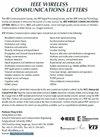Leveraging IRS Induced Time Delay for Enhanced Physical Layer Security in VLC Systems
IF 4.6
3区 计算机科学
Q1 COMPUTER SCIENCE, INFORMATION SYSTEMS
引用次数: 0
Abstract
Indoor visible light communication (VLC) is considered secure against attackers outside the confined area where the light propagates, but it is still susceptible to interception from eavesdroppers inside the coverage area. A new technology, intelligent reflecting surfaces (IRS), has been recently introduced, offering a way to control and steer light propagation in VLC systems. This letter proposes an innovative approach for enhancing the physical layer security (PLS) in IRS-assisted VLC by utilising the effect of the time delay induced by the IRS reflections. More specifically, we consider how to allocate the IRS elements in a way that produces destructive intersymbol interference at the eavesdropper’s location while enhancing the signal reception at the legitimate user. Our results show that, at a fixed light-emitting diode power of 3W, the secrecy capacity can be enhanced by up to 253% at random positions for the legitimate user when the eavesdropper is located within a 1-meter radius of the LED. We show that careful IRS allocation can lead to enhanced PLS even when the eavesdropper has a more favorable position than the legitimate user.利用 IRS 引起的时间延迟增强 VLC 系统的物理层安全性
室内可见光通信(VLC)被认为可以安全地抵御光传播封闭区域外的攻击者,但它仍然容易被覆盖区域内的窃听者截获。最近推出的一项新技术--智能反射面(IRS),为控制和引导可见光通信系统中的光传播提供了一种方法。这封信提出了一种创新方法,利用 IRS 反射引起的时延效应来增强 IRS 辅助 VLC 的物理层安全性(PLS)。更具体地说,我们考虑了如何分配 IRS 信元,以便在窃听者所在位置产生破坏性的符号间干扰,同时增强合法用户的信号接收。我们的研究结果表明,在发光二极管功率固定为 3W 的情况下,当窃听者位于发光二极管 1 米半径范围内时,合法用户随机位置的保密能力最多可提高 253%。我们的研究表明,即使窃听者的位置比合法用户更有利,精心分配 IRS 也能提高 PLS。
本文章由计算机程序翻译,如有差异,请以英文原文为准。
求助全文
约1分钟内获得全文
求助全文
来源期刊

IEEE Wireless Communications Letters
Engineering-Electrical and Electronic Engineering
CiteScore
12.30
自引率
6.30%
发文量
481
期刊介绍:
IEEE Wireless Communications Letters publishes short papers in a rapid publication cycle on advances in the state-of-the-art of wireless communications. Both theoretical contributions (including new techniques, concepts, and analyses) and practical contributions (including system experiments and prototypes, and new applications) are encouraged. This journal focuses on the physical layer and the link layer of wireless communication systems.
 求助内容:
求助内容: 应助结果提醒方式:
应助结果提醒方式:


